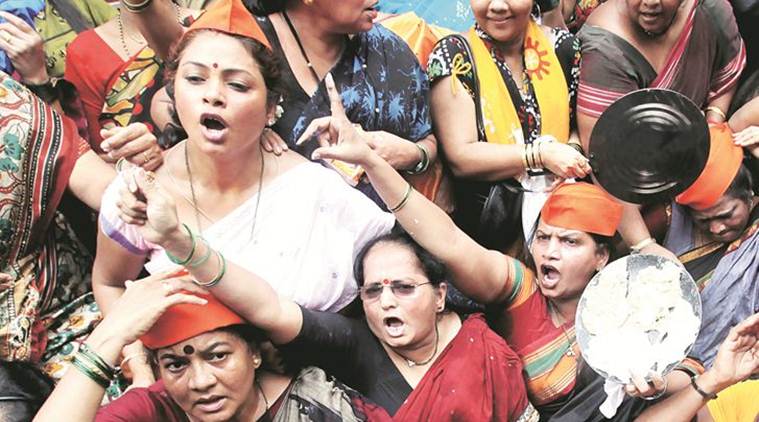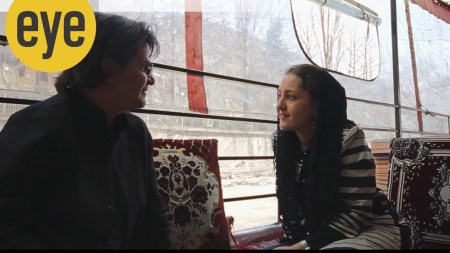- India
- International
Women at work, adjust please
The narrative that appears only as a faint backdrop is the politics of the Shiv Sena. The narrative of politics in the urban space is more prominent but not fully teased out.
 Women activists of the Shiv Sena protest at Shivaji Park in Dadar. Express Archive
Women activists of the Shiv Sena protest at Shivaji Park in Dadar. Express Archive
Book- The Dashing Ladies of Shiv Sena: Political Matronage in urbanising India
Author- Tarini Bedi
Publication: Aleph (originally published by State University of New York Press)
Pages- 291
Price- Rs 699
Tarini Bedi’s book, The Dashing Ladies of Shiv Sena, is based on 10 years of fieldwork in Mumbai (and partly also in Pune and Nashik) — between 2003 and 2013. It contains four somewhat intersecting narratives. The narrative that appears only as a faint backdrop is the politics of the Shiv Sena. The narrative of politics in the urban space is more prominent but not fully teased out. Third, the book converses with existing research on women actors of various right-wing or Hindutva organisations. But, most centrally, the core narrative of the book is about self-made women actors who become (or aspire to become) local political bosses. Bedi argues that long and sustained political careers, chosen by middle-aged women passionate about the public sphere, help them mediate in the functioning of the local state and shape their capacities as political entrepreneurs. The agency manifest in local women actors and their staying capacity as important players in a male-dominated world of power prompt the author to argue that their capabilities may be designated as “matronage”.
Richly punctuated with theoretical nuance and situated in a wide range of scholarly works, this book is written in a reader-friendly style. The author marshals evidence from her fieldwork to suggest that many assumptions and theoretical frames for studying women’s political activism require revisiting.

The book shows how political enterprise by Sena women critically depends on three pivots. One, the women actors whom we encounter in the book are keen about creating a “dashing” persona. This persona is embedded in vocabularies, in street action and occasionally in participation in the rough and tumble of vigilante violence. One could argue that these are all traits of Shiv Sena politics. However, as the book seeks to show, these are perhaps much more crucial weapons for women — they have to be dashing, daring and fearsome. More than men, they must curse, shout, slap and, above all, assert themselves.
Two, there is another key element that the author unravels very competently. It is about being visible. All her informants are acutely aware of the necessity to be visible and audible (they must speak loudly) in the male-dominated world of politics. Again, visibility is a common feature of public activism. Men and women alike are dependent on visibility. But whereas men acquire visibility through banners and posters, for women, that route is not easily accessible. They have to be visible to party colleagues and the party leadership; but more than that, they have to be visible to the public through their constant presence as one of the people and yet someone different from them.

Being dashing and visible, however, is circumscribed by a larger cultural and familial milieu. The author very effectively brings out the fact that both the “dashing” quality and the visibility of women constitute a transgression of traditional norms. And yet, there are limits to these transgressions. While many feminists would want women to be more liberated than Bedi’s informants, the author evolves a more realistic frame for situating the politics of “transgressions-within-limits” engaged in by women activists. That is the third pivot of their politics — adjustment.
From the point of view of developing a feminist understanding of local-level women actors, the chapter on ‘Politics and the Relations of Domesticity’ is most crucial. It does not presuppose what it means to be an independent woman; instead, it traces through the life and approach of women Shiv Sainiks how transgressions are made, and within what limits. In this beautifully structured chapter, the word “adjustment” comes up again and again, as the recess through which the women actors wish to slip past the obligations of domesticity and also the boundaries within which they see themselves indulging in transgressions.
The women are not interested in liberation from family but they do realise, instinctively, and through native wisdom, that family constrains their political persona. Instead of rebelling against it, they turn family into advantage — giving them respectability, acceptance in the local community, much-needed support and a launching pad. In the process, as the author shows with almost no comment on her part, the idea of adjustment gets subverted — the family members too have to and do make adjustments. This two-way process allows the emergence of the most unlikely political actors — lower middle class women activists.
Therefore, the author is encouraged to theorise that a new set of political entrepreneurs are in the making — urban women who deftly engage in transactional politics just as skillfully as men. Hence, the idea of matronage—transactions engaged in by women actors in which fear and affection are combined; the public and the private are all confused; (mostly informal) political power is sought in exchange of the capacity to provide services to mostly poor and less privileged women and men in the locality.
While the book provides valuable insights for developing a framework of analysis of women in politics, it does leave one with a few less convincing points. First, neither of these insights are specific to the Shiv Sena; they are equally applicable to most women political workers.
Two, the coinage of matronage is not exactly convincing because building networks and transactional politics is common to both male and female actors. Three, while urban spaces make it possible for women to both transgress and become dashing, it is not clear why villages do not provide the same opportunities. Four, in this extraordinarily touching depiction of women Shiv Sainiks, the risk of the ethnographer getting far too involved in the stories of the informants is visible at places. Ten long years of association has taken its toll on the author’s critical gaze.
Yet, the Dashing Ladies of Shiv Sena makes an important intervention in the way we understand local political actors. Like the naya neta, Bedi’s book will change the way we understand the aspirations, achievements and limitations of women political entrepreneurs.
Buzzing Now
May 04: Latest News
- 01
- 02
- 03
- 04
- 05

































